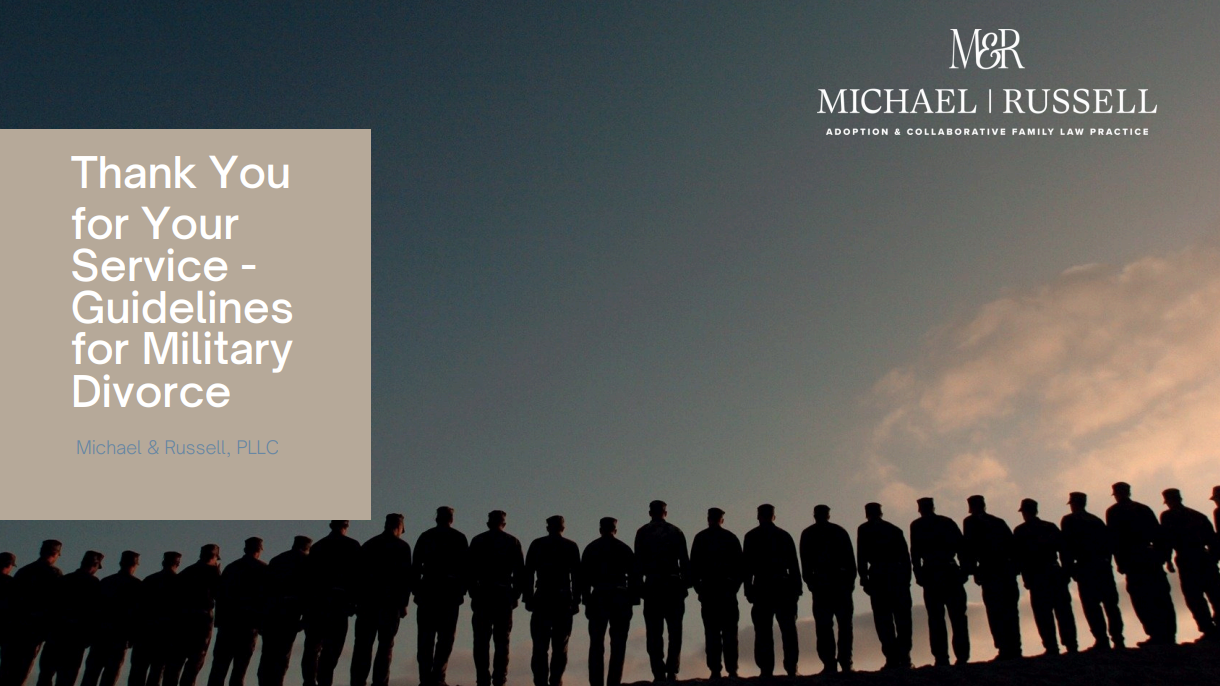
.png) TEAMAPPELLATE LAWBLOGHOME
TEAMAPPELLATE LAWBLOGHOME
Divorce is never easy — for anyone. But for active service members and veterans, the emotional and legal toll of divorce can come with unique challenges that many civilians may not fully understand. While the military divorce rate stood at 2.5% in 2023, there’s a silver lining: divorce rates across all branches have steadily declined since 2010.
At Michael & Russell, PLLC, we're committed to shining a light on these important trends and helping military families navigate the complexities of divorce. By raising awareness and providing experienced legal support, we hope to contribute to continued progress — and greater stability for those who serve.
Divorce is tough — but for military personnel, its impact can be life-threatening. Studies show that service members who go through divorce or separation face an increased risk of suicide — a risk that can persist for years after the relationship ends. 44% of the stressors experienced by military members who died by suicide in 2023 were reported to be relationship problems. A 2015 study found that divorced subjects were more likely to present with posttraumatic stress disorder, depression, smoking, alcohol-related problems, and other health issues. Divorce in military personnel was associated with negative mental health consequences and risky behaviors, but also tied to higher chances of post-divorce deployment.
As military families continue to face the hidden battles of reintegration, relationship strain, and emotional fallout, the Brothers at War documentary series — and its powerful evolution into Brothers After War — offers an unflinching look at life beyond the battlefield. In Brothers at War, founder Jake Rademacher follows combat units in Iraq, capturing their experiences on the front lines — including classified missions and intense battles — before documenting their return home and the profound impact of service on their families and relationships. In 2025, Rademacher revisited these stories in Brothers After War, reconnecting with twelve servicemen and women as they transitioned from active duty to civilian life, highlighting the emotional complexities and personal challenges of that journey.
Beyond the screen, Brothers at War has evolved into a workshop series that has supported over 40,000 service members and their families in the past two decades. These workshops focus on fostering post-traumatic growth by helping participants address shared struggles during the reintegration process. The Brothers After War Seminar continues this mission, offering veterans guided, interactive sessions and a strong sense of community support as they rebuild their lives post-service. Additional offerings — such as pre-deployment and spouse workshops — help strengthen the support systems of both active-duty personnel and those transitioning to civilian life.
At Michael & Russell, PLLC, we understand that the challenges highlighted in these stories — from strained relationships to legal questions around custody, divorce, and family stability — are very real for the people we serve. That’s why we're committed to helping military personnel and their families navigate these deeply personal struggles with care, clarity, and the legal expertise they deserve. Whether you're facing the emotional aftermath of deployment, a family breakdown, or simply trying to move forward, our team is here to support you — just as these powerful stories remind us why that support is so urgently needed.
Understanding education benefits during divorce is essential — especially when GI Bill benefits are involved. The Post-9/11 GI Bill provides education support to eligible service members and may be transferred to dependents, including spouses — even after divorce — as long as the service member does not revoke the transfer. However, the transfer of benefits is entirely voluntary and can be canceled at any time by the service member, per Title 38 of the U.S. Code. Importantly, federal law prohibits these benefits from being treated as marital property in divorce settlements, meaning they cannot be divided by state courts or included in the division of assets.
In contrast, Montgomery GI Bill benefits are not transferable to dependents under any circumstances. Because of these restrictions, divorcing spouses cannot rely on GI Bill benefits as guaranteed support. However, Michael & Russell can help you explore legal alternatives to secure financial support in a divorce settlement, including drafting agreements that reflect any commitments the service member has made. If you're facing divorce and need guidance on military education benefits or related family law matters, our experienced team is here to help protect your rights and your future.
For more information:
Call us today (910) 255-5722
Sources:
U.S. DEPARTMENT OF DEFENSE, 2023 DEMOGRAPHICS PROFILE OF THE MILITARY COMMUNITY,
https://www.militaryonesource.mil/data-research-and-statistics/military-community-demographics/2023-demographics-profile/ (last visited Aug. 5, 2025).
U.S. DEPARTMENT OF VETERANS AFFAIRS, DIVORCE, SEPARATION, AND SUICIDE RISK (April 2022),
https://www.mentalhealth.va.gov/suicide_prevention/docs/FSTP-Divorce-Separation-and-Suicide-Risk.pdf (last visited Aug. 5, 2025) (citing Shen, Y. C., Cunha, J. M., & Williams, T. V. (2016). Time-varying associations of suicide with deployments, mental health conditions, and stressful life events among current and former US military personnel: A retrospective multivariate analysis. The Lancet. Psychiatry, 3(11), 1039–1048).
U.S. DEPARTMENT OF DEFENSE OFFICE OF THE UNDER SECRETARY OF DEFENSE FOR PERSONNEL AND READINESS, ANNUAL REPORT OF SUICIDE IN THE MILITARY CY 2023, https://www.dspo.mil/Portals/113/2024/documents/annual_report/ARSM_CY23_final_508c.pdf (last visited Aug. 5, 2025).
Wang, L., Seelig, A., Wadsworth, S.M. et al. Associations of military divorce with mental, behavioral, and physical health outcomes. BMC Psychiatry 15, 128 (2015).
https://doi.org/10.1186/s12888-015-0517-7
BROTHERS AFTER WAR, https://brothersafterwar.com/ (last visited Aug. 5, 2025).
ABOUT GI BILL BENEFITS, https://www.va.gov/education/about-gi-bill-benefits/ (last visited July 31, 2025).
POST-9/11 GI BILL (Chapter 33), https://www.va.gov/education/about-gi-bill-benefits/post-9-11/ (last visited July 31, 2025).
TRANSFERRED EDUCATION BENEFITS FOR FAMILY MEMBERS, https://www.va.gov/family-and-caregiver-benefits/education-and-careers/transferred-gi-bill-benefits/ (last visited July 31, 2025).
38 U.S.C. § 3319 (f)(2).
38 U.S.C. § 3319 (f)(3).
Does a Military Service Member Have to Transfer Their Post-9/11 G.I. Bill Benefits to a Child in a Divorce?, BOURDON & TORTOLERO, PLLC (October 9, 2024),
Carl O. Graham, Explanation of Divorced Military Spouse Benefits, MILITARY DIVORCE GUIDE FROM GRAHAM LAW,
Carl O. Graham, Post-9/11 GI Bill Benefits in a Divorce, MILITARY DIVORCE GUIDE FROM GRAHAM LAW,
https://www.military-divorce-guide.com/pay-records/post-911-gi-bill-benefits-divorce.
*Written with the help of AI.